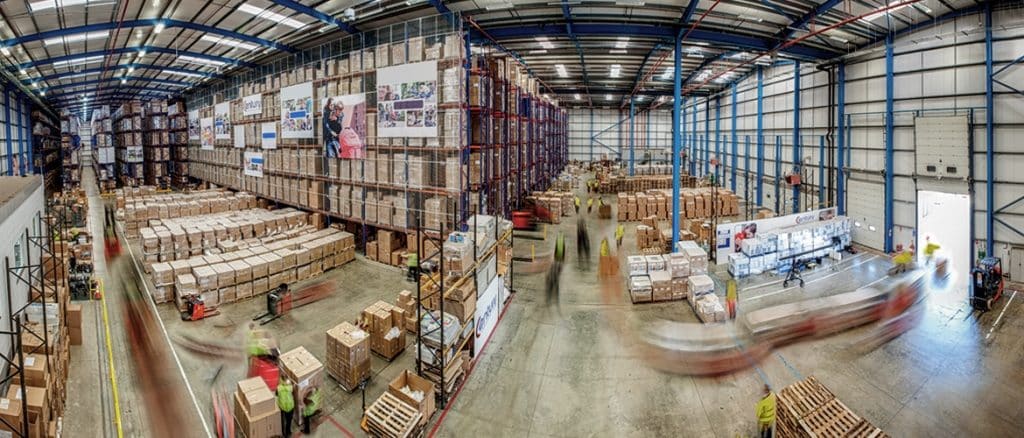How logistics is changing the face of Industrial Warehousing. For many years, there was no such thing as a specialised logistics position at most companies. However, with modern globalisation and businesses starting to ship their products outside of their regions, logistics has become a significant part of many companies.
Warehousing logistics implies the physical distribution of goods. Such distribution typically incorporates the entire supply chain from the manufacturer to the end consumer. The logistics warehouse has become a critical and integral part of the process. Globally (and in South Africa), many companies deal in warehousing and delivery. These companies are committed to providing value-based warehouse solutions tailored to their supply chain processes. Most of all, these businesses can transform the warehouse from a cost centre into a source of value that benefits the organisation.

People strive to work smarter by utilising the m³ of warehousing instead of just the m².
People who work in logistics need to be creative in trying to keep costs down for the company. Also, they need to figure out quick and easy ways for companies to alert suppliers when they need more products. Barcode labels and laser printer labels have made life easier for those in logistics. Now, when a product’s code is scanned, it can alert the supplier immediately that one unit has been sold/left the retailer or company. Keeping up with how many codes have been scanned helps forecast when a new shipment will be needed. How fast the units are leaving the retailer or company is also tracked. All of this and more is part of the job of someone working in logistics.
See some modern examples of logistics-friendly buildings in Epping Industria in Cape Town:
A new warehouse under construction – 2018- Modern logistics warehouse with raised loading facilities – construction in 2018
- Warehouse built with storage and logistics in mind
- Ex Ellerines central logistics warehouse
- Ex-Marley warehouse
Click here to see all the new industrial property developments in Cape Town.
Logistics is considered to be the brain of the supply chain. Industrial Warehousing Logistics is a vital yet, decisive component of a practical overall supply chain management systems solution. Also, logistics operations must remain competitive. A warehouse is a point in the logistics system where a firm stores or holds raw materials, semi-finished goods or finished products for different over.
Warehousing for logistics companies has been the leader in the industrial sector during the last five years. Most leading businesses prefer new industrial buildings. The market-oriented warehousing allows a firm to provide the customer with shorter lead times. This storage function continues to be progressively more important. Companies and industries utilise customer services as a dynamic, value-adding, competitive tool. As competition increases, companies are looking to their properties and their landlords to assist them in being more competitive.
View warehouses for rent in Cape Town
The utilisation of height of warehousing has become necessary. Many companies are utilising functional stacking heights of 12m or more. This also involves using forklifts that operate safely and efficiently at these heights.
Tony Bales of Epping Property confirms that in South Africa, several property owners have strategically moved into owning high-tech logistics warehouses and renting them out to companies. Such specialisation has been helpful as there are many aspects that the modern supply chain process demands that such property specialists can cater for. Another benefit for property owners is that many leading warehouse users are larger and more stable companies, offering the landlord a more stable and low-risk income stream into the future.

Industrial property – the best performing sector of property
The IPD South African Annual Property Index showed in April that Industrial Property was the best performing sector of the property market with a total return of 13.6%, outperforming the traditional leader, retail, at 12.6%. Most of these owners have substantial portfolios of Industrial Warehousing. This is confirmed by the reduction of vacancy levels seen in the Epping Industrial Property Index in recent years. See How to invest in the Industrial Property Market in South Africa.
Strategic Industrial Warehousing Logistics planning permits the organisation to align the operations with overall business objectives. This helps it to be equipped to meet technology changes, globalisation and the demands of a more interactive supplier community. Strategies in warehousing logistics include inventory management, production scheduling, transportation and organisational communications. For example, RFID (radio frequency identity) is going to transform not only logistics but also retail at some point in the future. (Walmart is already using RFID in the USA). International retailer Zara is using RFID in South Africa. These can create an optimised distribution network and competitive advantages.
Such a network has various objectives such as either, speeding the supply of the products or speeding the cash flow. A high level of growth in the revenue for all the companies involved in the chain is ensured. Customer loyalty improves commitment and competence. It helps to keep costs as low as possible while maintaining excellent customer service.
Logistics has become critical to companies
Logistics has become an even more crucial part of all companies even since shipping across not only the country but also across the globe began. In Africa, for example, the logistics sector has seen a massive amount of growth during the last five years. Therefore, it is essential for everyone to understand the importance of logistics as our economy becomes much more global. Businesses in the United States are regarded as only now starting to expand globally, which will include much more work for those in logistics.
It is going to be quite a challenge for those in the field to adapt to the global market. Numerous different transportation and warehousing aspects will be coming into effect. One thing is for sure, however, the future of logistics looks to be fast
See an example of a new, modern warehouse.
